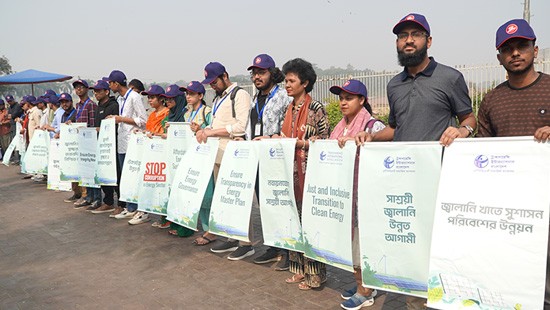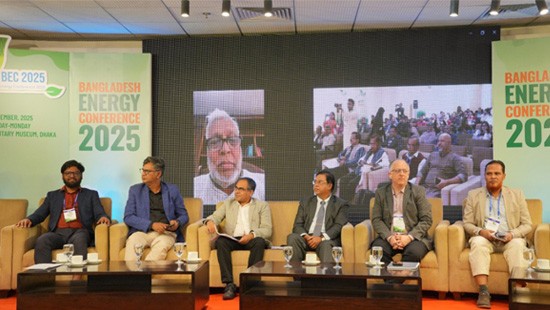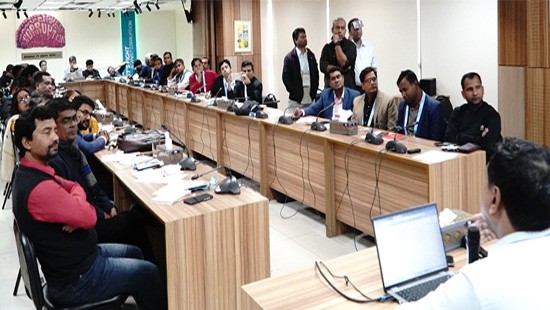Published: 12 July 2020

Political will, effective enforcement of law and transnational collaboration are imperative to fight organised crimes like human trafficking, money laundering, and corruption, said speakers at a webinar.
They also said civil society could play a critical role in these areas by ensuring necessary legal reforms and increased public awareness.
Kuwait Transparency Society (KTS) and Transparency International Bangladesh (TIB) jointly organised the webinar titled “The Role of Civil Society Organisation in Combating Transnational Organised Crime” on 12 July 2020 with the focus on human trafficking, money laundering and corruption.
In her introductory speech, TI Chair Delia Ferreira Rubio highlighted the link between corruption and money laundering crimes and the initiatives taken by TI in combating those.
“Laws, policies and enforcement are important to combat corruption. Transnational crime could be curbed through collective and transnational efforts,” said Delia stressing further on an appropriate and independent legal structure, necessary resources, i.e. financial allocation, technological capacity and extensive oversight of relevant authorities.
KTS Chairman Majid Al-Mutairi shed light on the critical issues that recently appeared and circulated in the media and social networks related to money laundering, human trafficking, illicit gain and embezzlement, and KTS’s role in combating these crimes.
Recognising the prevalence of corruption and money laundering cases in Kuwait, Majid emphasised punishing the corrupt to prevent the pervasiveness of graft. He also hinted that the law enforcement agency couldn’t make some arrests due to diplomatic immunity.
In his presentation on `Alleged involvement of a Bangladeshi public representative in human trafficking and money laundering: Implications and opportunities’, TIB Executive Director Dr. Iftekharuzzaman said, “Apart from the allegation against arrested Bangladeshi MP in Kuwait, there have been many allegations of corruption cases including money laundering, human trafficking, drug, abuse of power, and illicit gain of public money against several MPs. The arrest of a Bangladeshi MP in Kuwait for such organised crimes is embarrassing for Bangladesh.”
He said such allegation caused potential damage in the international relations of Bangladesh with the countries that are the destination places for expatriate workers causing the risk of losing the job market.
Asserting available national and international laws and provisions to bring those involved in organised crimes under accountability, Dr. Zaman said, “The key issue in such cases is enforcement of the national legal provisions and international commitment for accountability and repatriation of illicit transfers in due process.”
Dr. Zaman also emphasised that civil society and media play a significant role in preventing such crimes. `It is essential to take immediate and effective legal action against the arrested Bangladeshi MP in Kuwait in the interest of the dignity of the country and the parliament`, he added.
Former Kuwait Parliament member Dr. Hassan Joharemphasised the role of members of the legislative authorities in combating organised crime. He also elaborated on the inability of the supervisory agencies to play their preventive role, especially after the recent transformation of the State of Kuwait into a front for money laundering and human trafficking.
He stressed restructuring the legal system and the whole management of the sector to ensure corruption prevention and a fair employment system.
Terming corruption a virus, like COVID-19, Member of Parliament of Bangladesh Saber Hussain Chowdhury said, “Such virus needs a broader and holistic approach to uproot. No one can be exempted from this. Many of Bangladesh's MPs have maintained their strong stance against corruption. Therefore, it is important to exchange experiences and strengthen collaboration between countries in the prevention of corruption. In particular, it can be very effective in suppressing transnational organised crime.”
Dr. Dalal Al Saif of Kuwait University-Law School discussed legislative deficiency in implementing the United Nations Convention on Transnational Organised Crime agreement under Kuwaiti criminal law. Citing recent instances of increasing human trafficking and money laundering cases in Kuwait, she stressed necessary legislative reforms in Kuwait.
Asrar Hayat, Member, Board, KTS moderated the seminar.






